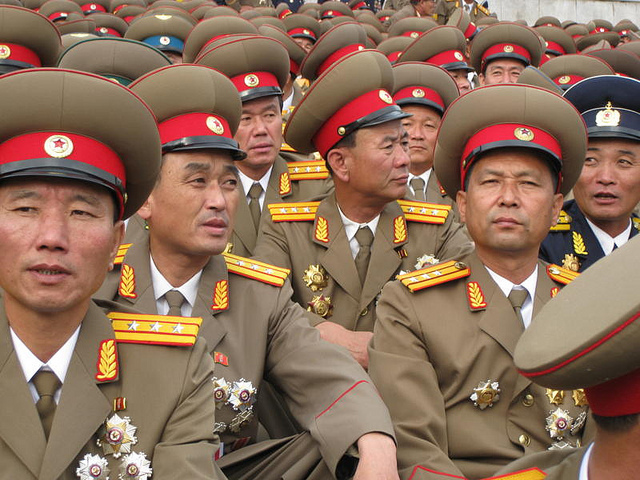The Peninsula
North Korea Rocket Launch: Shunning Prospects for Better Relations in 2013
Published December 12, 2012
Category: North Korea, Inter-Korean

By Nicholas Hamisevicz
North Korea’s decision to launch a satellite in the midst of important regional political transitions underscores its disregard for building better relations with new leaders throughout its neighborhood. Rather than creating a favorable environment for South Korean presidential candidates who had been talking about re-engaging with the DPRK, Pyongyang has slammed the door in South Korea’s face on the eve of critical elections. With high level talks that had been scheduled to take place with Japan recently called off on news of North Korea’s rocket plan, it seems Pyongyang felt that rapprochement with Tokyo could wait. And although China new leadership attempted to dissuade North Korea from going ahead with the launch, Kim Jong Un’s government seemingly isn’t worried about being the cause of Xi Jinping’s first foreign policy crisis.
The timing of today’s rocket launch shows that North Korea’s leadership calculated that immediate internal benefits far outweighed any potential gains from the outreach in 2013 that may have materialized without a launch. Indeed, the prospects for increased engagement, aid, and better regional ties have all now been shunned in favor of actions North Korea’s neighbors other than China view as provocative. Instead, it appears that North Korea was motivated to go ahead with the launch in order to gain from key domestic reasons related to symbolic timing, domestic prestige, and military considerations.
As we know, North Korea’s previous April 2012 launch appeared to be a continuation of Kim Jong-il’s policy to celebrate the 100th year anniversary of Kim Il Sung’s birth. Seemingly, the late Kim had hoped that by putting a satellite into space, Pyongyang would be able to demonstrate to its people that North Korea was indeed becoming a “strong and prosperous” nation. The April launch was an embarrassing failure, so it seems Kim Jong Un was compelled to try again, with this December launch announcement connecting the new attempt to the “true to the behests of leader Kim Jong Il.” Moreover, commemorating of the 100th anniversary year of Kim Il Sung’s birth and the one year anniversary of the death of Kim Jong-il with a successful rocket and a satellite in orbit was another bonus for internal sentiment and the legacy of Kim Jong Un as a leader.
KCNA’s reporting on today’s launch also illustrates how domestic motivations were extremely important for North Korea. The internal prestige Kim Jong Un will have garnered through a successful launch is not hard to see, with DPRK media quickly showing dances in Kim Il Sung square and placing ecstatic news presenters on TV to break the news. With the launch being hyped domestically as a major policy success of the regime, it will also very likely help Kim Jong Un consolidate power during his first year as leader.
An additional motivating factor may have been Kim Jong Un’s desire to placate possible military pressure by trying a second launch. Recent reports indicate numerous military purges have taken place of late in North Korea, with the high profile departures of Ri Yong Ho and Kim Jong-gak suggesting that Kim Jong-un has been working hard to replace foes with individuals he believes can better support his vision and rule. But because some of these former foes were well respected military officials, Kim may have also used this launch as a means to buy much-need approval and time from an uncertain military.
While North Korea’s satellite success will lead to a number of domestic gains for Kim Jong Un, an external environment that had appeared ready for better relations with North Korea will now change. The apparent success of the rocket launch will increase pressure on the United Nations to think of new ways to punish North Korea’s Security Council Resolution violations while at the same time decreases the chances for any inter-Korean, Japanese, or U.S. based engagement. Those countries could potentially take more unilateral measures against North Korea to punish this action and try to prevent future provocations. North Korea’s assertiveness in launching a rocket despite encouragement not to do so from its most important donor, China, puts focus on Xi Jinping and the new Chinese leadership. Outcomes from the UN Security Council and China’s own unilateral response will quickly provide evidence to the international community about China’s future relationship with North Korea. Unfortunately, early statements from China and commentary from Xinhua suggests North Korea can continue to count on Chinese support after this launch.
In short, the regional dynamics have changed for the new and incoming leaders. The launch will draw the U.S. and its allies closer together and provide an important common ground that can get South Korea-Japan relations off to a more positive in 2013. The successful launch makes it difficult for Japan to restart the postponed talks with North Korea. The launch indicates North Korea’s willingness to choose internal benefits over outside support with a confidence that it can survive on its own, with some unspoken hope that China’s support will not wane too much, if at all.
Finally, the rocket launch demonstrates that North Korea will disregard international resolutions and interactions with its neighbors despite efforts and opportunities for engagement. These factors indicate 2013 will be even more complicated for the regional players in Northeast Asia courtesy once again of North Korea.
Nicholas Hamisevicz is the Director of Research and Academic Affairs for the Korea Economic Institute. The views represented here are his own.
